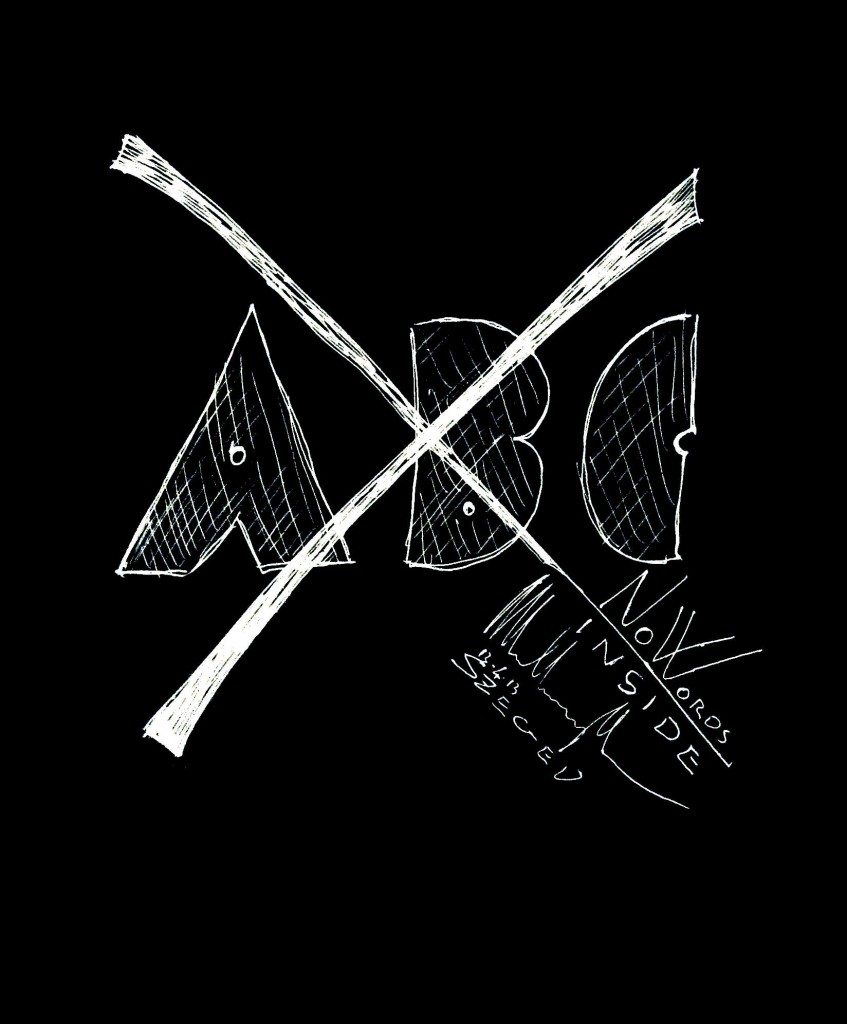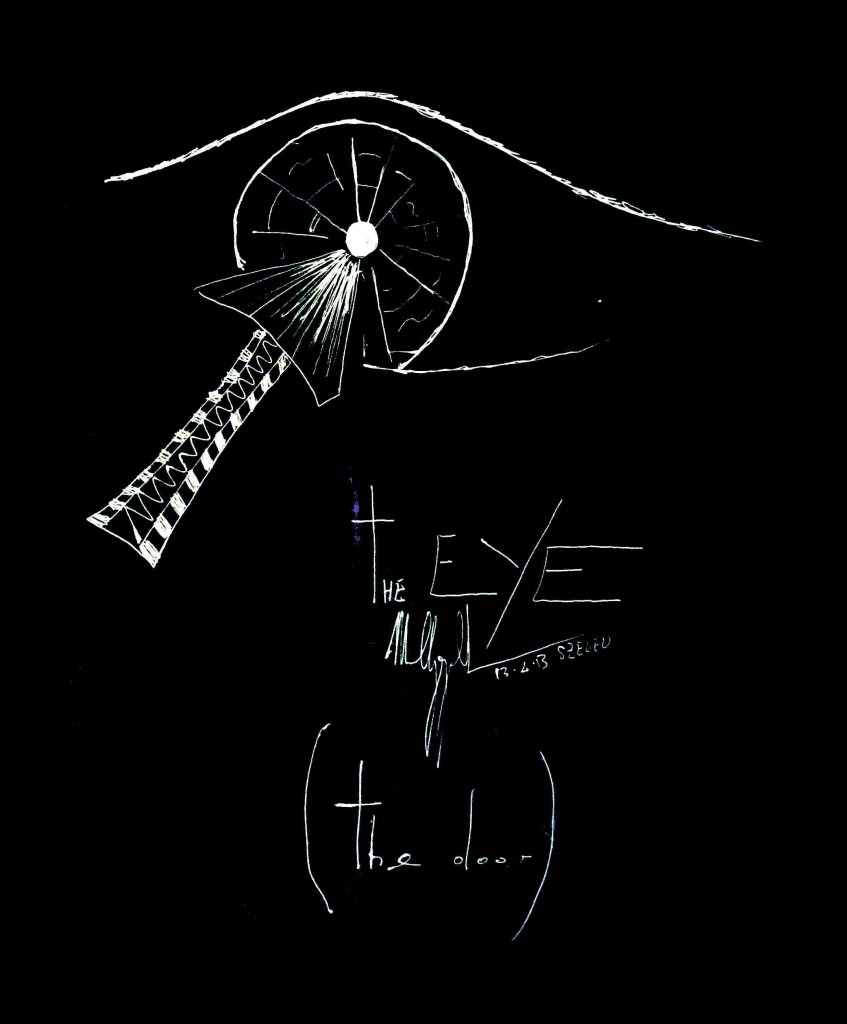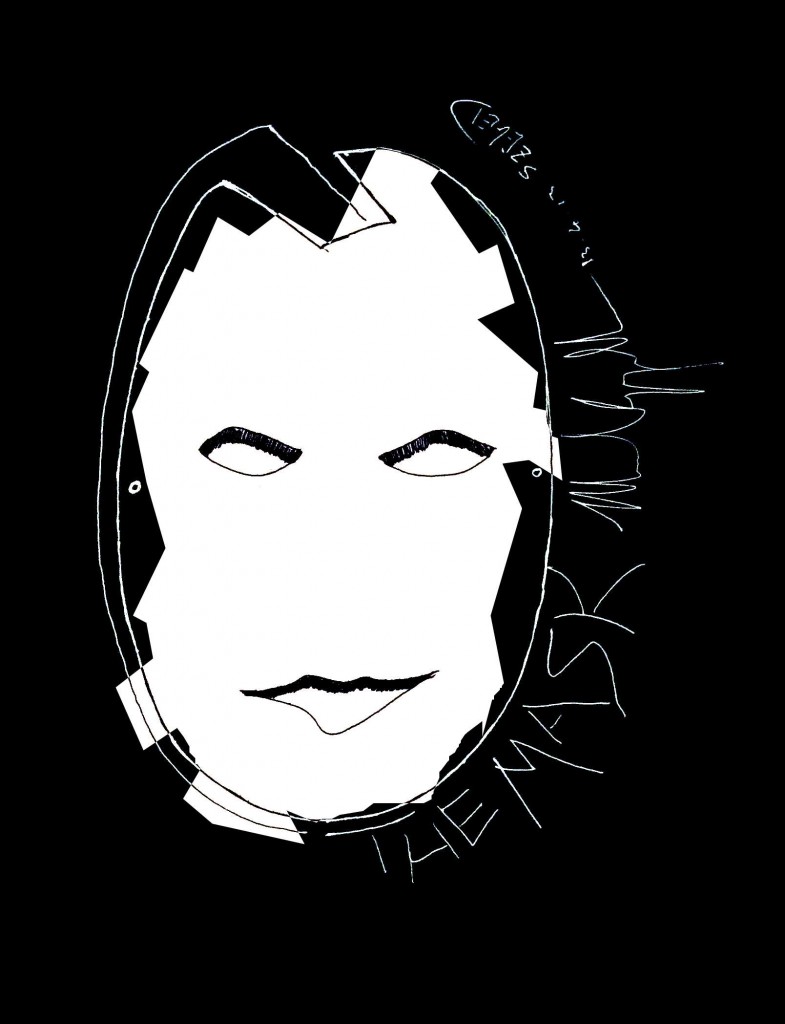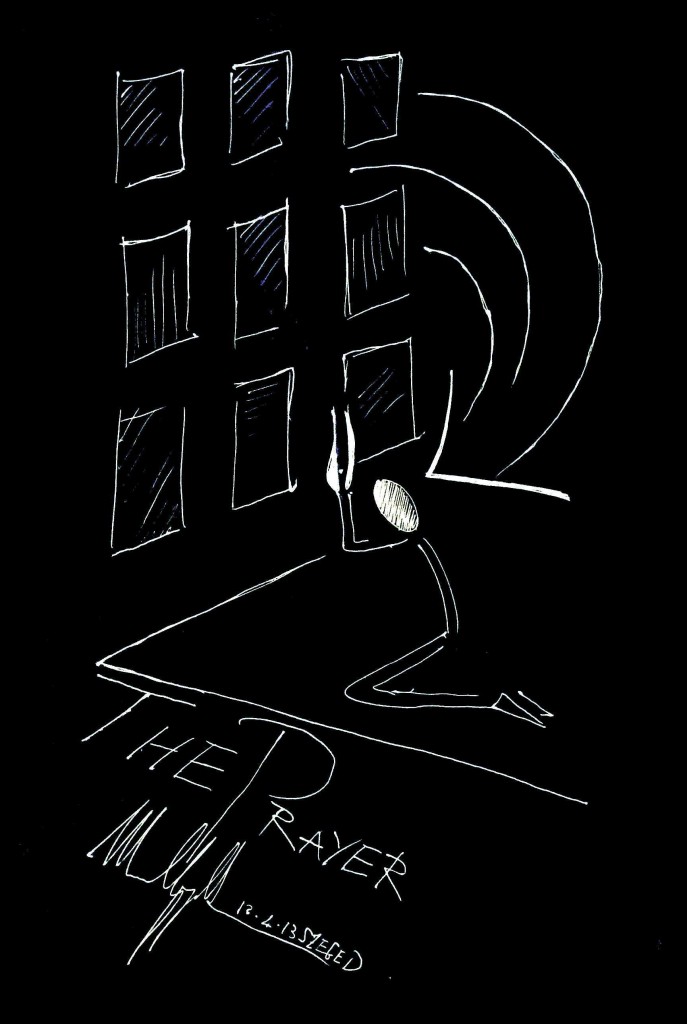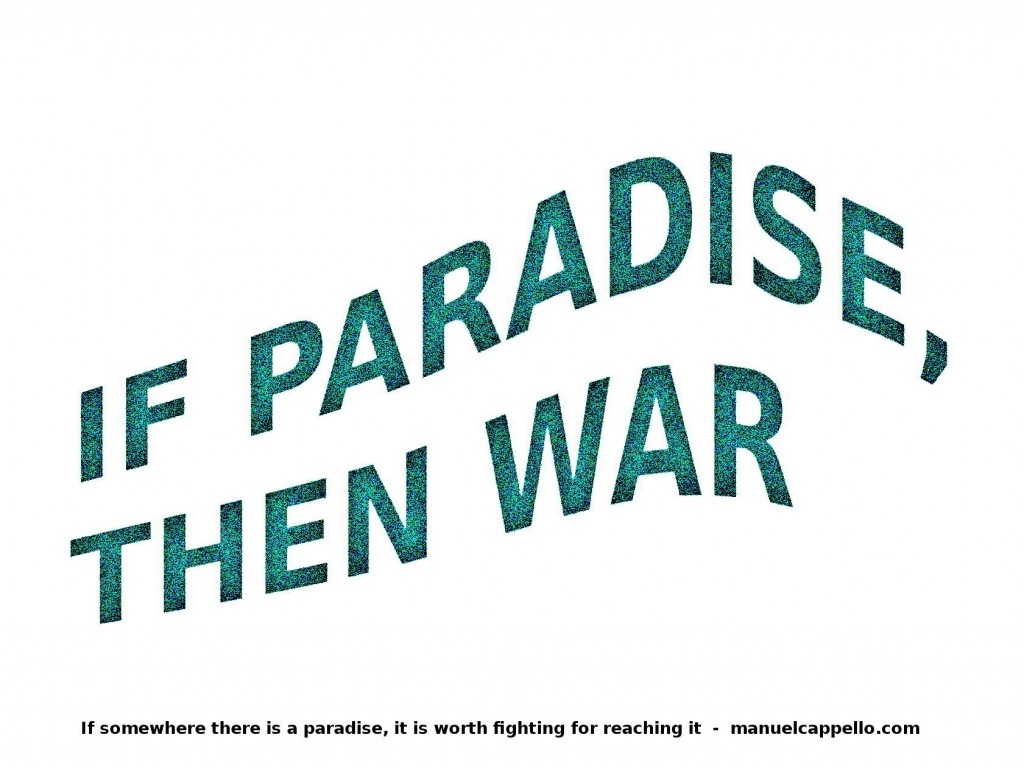Tag Archives: new religious form
The Eye
The Mask
My Religion: the Prayer
If Paradise, then War
THE DANCE OF HERE AND NOW: A POCKET PARADISE
MY DANCING RELIGION
THE WORLD: A GREY CONTEXT
DANCING: THE ZONE OF COLOR
THE WORLD: A GREY CONTEXT
Our thought is the art of organizing what we see according to an aim, but what we see is dramatically little in respect of the deafening bustle of becoming that everywhere blazes in the world, in offices and minds, on screens, in factories and atmospheres.
We think we know how things will go, and we create an image about it in our head. But the rest of the world does not organize to comply with our expectations. There is an intrinsic nature in things, proceeding according to its own rules, indifferent to our programs. Above all, there are the intents of other men, opposed to ours.
Meshes of reasoning become larger, trying to wrap up consequences and conditions of productive processes, but one cannot take care of all. It suffices to wait, and always something unforeseen arrives that forces us to change our thought readjusting it to the world. Our expectations are a crystal that will fall apart in the insensitive gears of becoming.
There is something wicked in the way man falls in love with his projects over the world, that come to life with so much enthusiasm but then trap in themselves the same man that loved them, making sad his reasoning. Society functions by this perversion, which mechanism is difficult to escape.
But if the reasoning about the world became sad, then thought needs a place aside where he can forget the world. If society is a high forest where light does not penetrate, we look for a glade with no shadow to retrieve the sky. We move away from the future to stay in the present, forsake the rest of the world to look only at these houses, divert ourselves from people and withdraw in the interior that does not speak.
Aries Tottile said that if man is reason, then the good for man is the practice of reason; but man is also and above all body. Putting aside the broken reasonment to make more room for the body can be the best strategy for later coming back to a reasonment that moves from cleaner ambients of the thought.
Often the will that organizes action to reach objectives ends to create a sort of smoke-screen between us and our movements, that are accomplished without being lived. But once we turned our back to the tainted reasonment, action can free itself from slavery of results, and gets access to that amount of sacre that is inherent in every gesture.
So, i’m ceasing to feed the thoughts of projects and of society duties. I let the images about work, people and news turn pale. After parking attention into the listen of breath, i look with the corner of my eye at the thoughts of the day keeping on sprouting. But if I hold myself and don’t watch, if I don’t pluck them, they return underwater, as a dolphin that after coming out in the air falls again. If before reason sent the order of movement by a telegram, now he listens to what body has to say. It’s the moment of adherence, the moment for attention to spread through the volumes of flesh, through the great muscles of arms and legs but even through the tiny ones which names are known only to doctors. It’s the moment for welcoming the sound organized in rhythms and harmonies of superimposed notes: music, the trainer of body and thought.
THE ZONE OF COLOR: DANCING
Among the leaves of a tree the sight of man looks in the hope of a fruit, and when it turns to interpret a face, the arrangement is made around the eyes. In the same way the mind longs for the polar points of a musical structure, and when it seems that something has been found, the mind makes a test, trying to seize that something with the captain of all gestures: the foot that meets the floor.
Every time the gesture guesses the time, energy does not diminish due to the accomplished work, but rises with the soundness of the musical sensation. And if the game of legs is well done, then the soul of inspiration takes possession also of trunc, arms and hands, till the articulations of fingers. Body structure is put in the service of music structure, as it were a puppet of manifold possibilities, and simple gestures that beat time are followed by more elaborated editings.
In adventure films, there are secret tiles, and when someone tramples by mistake on them, hellish traps spring up and palaces crumble. In this video-real-game instead, there is a secret G point inside the cement, moving just under the surface, like a big worm of Dune, and when you succeed in following him with your steps, the floor comes to life and becomes an animal to be ridden. When you lose his traces you have to stop, still like a silent statue waiting for the intuition to re-find the position.
But we are not in a twentieth century theatre workshop, and he is not an athlete the one who is dancing, interested in tougher muscles for more powerful jumps. He’s a citizen of the sad empire that by profession does something other, and uses with love the body available to him to play the score, without getting angry about the limits of his instrument. It is not the intensity of the physical performance ruling in this game, but the syntax of the movement words the inner director disposes of.
And there where fatigue lets its voice be heard, the dancing citizen interposes immobile pauses or lessen beyond measure the intensity of every movement, till it remains only a nod of the head or the look. But never he gives up about getting charmed by the fire-flies that kindle in the magic triangle among body, mind and the organized sound.
Man’s book teaches us a dance for building up the kingdom of here and now, giving a sense to the enterprise of facing the other coming against us in the days. It’s not a dance to comply with the look of a public; it’s a form of beauty that is not observed by the ones outside, but by the unique one[1] inside.
- [1]A clarification: I did not use this expression to indicate the faith in a monolithic “I”, that on the contrary I feel as manifold. I think the convention of a unitarian grammatical “I” to be a method that can be freely employed on the basis of the situation. In this specific case, the unique one is the mental point where inspiration is going to take shape, not bidden by an order, but invited by waiting.↩
THE BIRTH OF A RELIGION: KNOWLEDGE, CONTEXT AND TRANSPARENCY
BOOKKEEPING AND CRYSTAL CLOCKS
An accounting preamble: context ignorance
When I began working in the purchasing office, still I didn’t know anything about accounting. Only, I gave the suppliers’ invoices to the external accountant, with some days in advance in respect of the VAT deadline. I had no idea about the routes the accounting clerks forwarded the documents to. If one talked about liabilities and equities I could follow the reasoning for a couple of sentences, but then I did not understand anymore the direction of credits and debits. I was aware there was a list of all the accounts and that it’s just called chart of accounts, but I knew a few entries only belonging to the expenses section; more precisely, I knew the entries positioned in the top part of that section, the ones related to the raw materials I was used to manage. Yet the subdivisions among the different kinds of services made me suspicious, and I knew that going more down there was strange things like the non-deductible input tax, amortizations, capital losses, or the cash over and short account.
After a couple of years from my entrance in the company it came the moment for us to bring the accounting inside (before, as I just hinted at, the accounting was managed by an external accountant). This happened together with the purchase of an AS400 server, and it was me managing both these changes, seizing the opportunity for learning how the accounts work.
We were in the half of the nineties, and Google was not there for helping me; I learned the matter from the programmer of the accounting software, and of course asking something to our external accountant. In a few weeks I started understanding the difference between credits and debits happening in the Assets rather than in the Revenues, and within some months I became familiar with bank accounts and year-end tasks. Now I usually record customs bills of entry, purchasing invoices with many different types of VAT, payroll liabilities and expenses. Let’s say I know enough about this stuff to weigh the competencies of an accounting clerk in a job interview.
Context awareness and crystal nature
There was a time when ignorance was prevailing, and to me accounting was a bother only, an address to which I sent requirements and from which I awaited answers. I saw what entered it and what came out of it, but with no understanding about the linkage between the input and the output. The ignorance about the issue sometimes brought me to underestimate its complexity, or, on the contrary, to fear excessively its consequences. Behind that word, there was in my mind an aggregate of external points of view, not a thoughts structure pertinent to the reality that it pointed out.
Subsequently an experience took place by means of which a sound awareness of the context built itself up, and today, before the voucher of the bank, I don’t hang on pondering anymore: soon I proceed recording it in the book of original entry. If checking the bank statement I find something that does not balance I just have in mind where the origin of the matter can be found. Yesterday, bookkeeping was the name of a wood which paths I didn’t know, today it’s a domain I can see through as it was a crystal clock in which I distinguish the moving mechanisms.
As months and years went by, I got skilled in other areas too inside the company, discovering crystal clocks in the sales office and in the production department, in the human resources management and in the most technical issues. Outside business, I found crystal clocks in women’s behaviours, in politicians’ talks and of course in university courses.
Transparency as a life-style
By experience and study, mass becomes transparent. Every work is a cultivation that makes the ground evaporate, leaving visible the knowledge gold seam. Earth is temporary only. The eyes sight teaches us the opaque surfaces, but we prefer looking for the crystal clocks. Transparency becomes a religion, consistent with the production context and capable to lead us to the most coloured countries of the Here and Now.
Sure, knowing the unknown contexts can be learned it’s not enough to make them transparent, but we can make it easier to happen, changing the mind attitude by an expectation for a transparent world. The difference is in becoming aware that every opaque substance is the starting point only for discovering an impalpable relations system. There is a change in the stance towards mass, that stops being a barrier against the unfolding of the thought, which tracks branch off in every direction, like Escher’s staircases. Objects become paths webs and the world turns to be the moves of a bright thought without any shadow.

